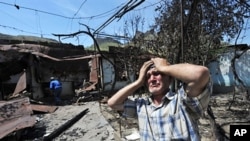Officials say the unrest that began last Thursday in Kyrgyzstan has so far killed at least 124 people and wounded more than 1,600 others, but Uzbek community leaders and Red Cross officials say the death toll is much higher.
Many homes are reported on fire in the cities of Osh and Jalalabad and other towns of southern Kyrgyzstan, where gangs of the majority ethnic-Kyrgyz population went on a killing spree against Uzbeks on Friday. There has also been widespread looting of Uzbek shops.
The International Red Cross estimates about 80,000 refugees have fled the unrest, mostly women and children. They went to Uzbekistan or are stuck on the border with that country. Men are staying behind to protect homes and remaining family members.
In addition to the scores of reported deaths, about 1,500 people were injured. Some Uzbeks are claiming there have been considerably more fatalities.
Avas Saipov, whose journalist son, Alisher Saipov, was murdered in Osh in 2007, confirms widespread reports of corpses lying in city streets. He spoke from an undisclosed location in southern Kyrgyzstan.
Saipov says even the dead cannot be properly buried. He says many corpses are instead being burned to destroy evidence of crimes being committed.
The younger Saipov was a stringer for VOA's Uzbek Service.
On Sunday, elders representing the Kyrgyz and Uzbek communities met in Osh to discuss ways to stop the violence. They shared a loaf of bread in a symbol of friendship, but their call for peace has gone unheeded. The level of animosity is described by Kyrgyz Health Minister Damira Neyazalieva, who gave blood in Bishkek for victims in Osh.
The health minister says there were appeals for help from the Jalalabad hospital, where an ambulance left the facility but was stopped on the way. She says the ambulance was seized by unidentified people, and the doctors were taken hostage, beaten up and injured.
Several instances of ethnic violence in Central Asia during the past 20 years are indirectly attributed to borders drawn between Soviet republics by communist dictator Josef Stalin. Historians say those borders were created on purpose to divide and conquer ethnic groups by pitting them against one another.
Many Uzbeks and interim Kyrgyz President Rosa Otunbayeva are blaming the latest round of unrest on ousted Kyrgyz President Kurmanbek Bakiyev, whose base of support was in southern Kyrgyzstan. Ms. Otunbayeva says his motive is to disrupt a constitutional referendum on reducing presidential powers scheduled for later this month.
Mr. Bakiyev denies any role and blames interim authorities for failure to protect the people.
The United States, the European Union, Russia and others have expressed growing alarm about the situation. In Moscow, President Dmitri Medvedev called a meeting of its allies in the Collective Security Treaty Organization to discuss the matter. Russia and the United States both have air bases in Kyrgyzstan.
Interim Kyrgyz leader Otunbayeva has asked Russia for military assistance to bring the violence under control. Avas Saipov and others say international peacekeepers are needed to stop the violence.
Related video report by Robert Raffaele:












